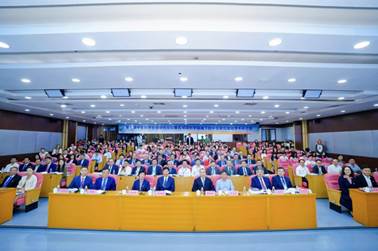On October 19, the 7th Central Asia Economic and Social Research Forum, along with the International Symposium on Central Asian Studies from the Perspective of Regional and Country Studies, was successfully held at Xiasha Campus. The event brought together nearly 200 experts and scholars from over 40 universities and research institutes, including the Chinese Academy of Social Sciences and 13 universities from the five Central Asian countries, to engage in discussions on hotspot issues concerning China and Central Asia. Prominent attendees included Chen Jianzhong, president of the Zhejiang Council for the Promotion of International Trade, Chen Yanqin, deputy director of the Zhejiang Provincial Foreign Affairs Office, and Li Jinchang, secretary of ZUFE’s Party Committee, all of whom delivered opening remarks. Prior to the forum, President Wei Jiang met with some of the attending domestic and international guests. The opening ceremony was chaired by Zheng Yali, vice president of ZUFE.
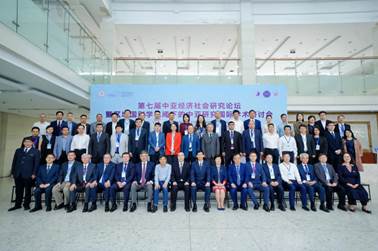
In his speech, Li Jinchang emphasized that regional and country studies are strategic disciplines that serve the overarching framework of major-country diplomacy with Chinese characteristics and contribute to local economic and social development. These studies are marked by their strategic importance, policy relevance, and integrative nature. He highlighted ZUFE’s commitment to building a new academic ecosystem marked by international openness and cooperation, and integrating regional and country studies into the “New Finance and Economics Strategy” by establishing the Central Asia Research Institute. This institute aims to fulfill roles in “informing policy, advising businesses, enlightening the public, and fostering exchanges,” thereby aiding in the development of a new disciplinary system and providing high-level support for China’s “the Belt and Road Initiative”.

Chen Jianzhong noted that since the establishment of the Central Asia Research Institute through collaboration between the Zhejiang Council for the Promotion of International Trade and ZUFE a year ago, both parties have engaged in extensive cooperation in areas such as research projects, white paper compilation, and decision-making consultation. This collaboration has significantly advanced the development of an applied regional and country studies think tank. He expressed hopes for the university to continue leveraging its strengths in economics and law to further advance economic and trade collaboration between Zhejiang and Central Asian countries.
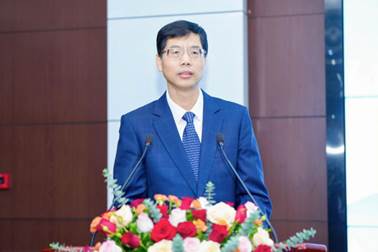
Chen Yanqin acknowledged the longstanding friendly relations between China and Central Asian countries. She expressed hopes that the university would take this forum as an opportunity to promote organized international scientific research and talent cultivation, deepen high-level collaborations, and strengthen cultural exchanges, thereby contributing to the economic and social development of Zhejiang and Central Asia and ushering in a new “Golden Thirty Years” of China-Central Asia relations.
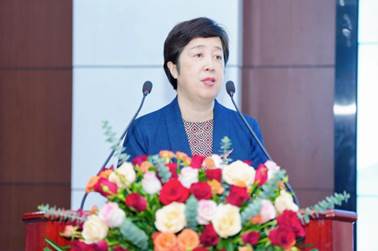
The opening ceremony also featured the release of the “White Paper on Investment and Business Environment in Central Asian Countries” and a book donation ceremony for the bilingual Chinese-English edition of “Manuscript Philology of Dunhuang.”
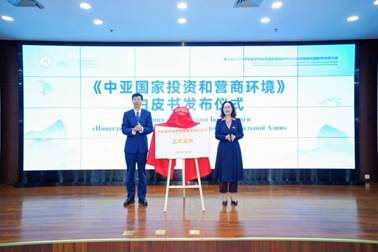
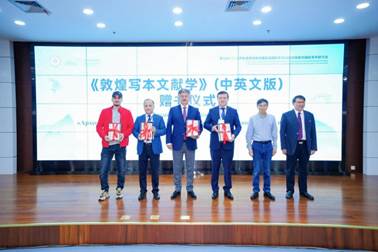
Prior to the forum, President Wei Jiang met with some of the attending domestic and international guests.
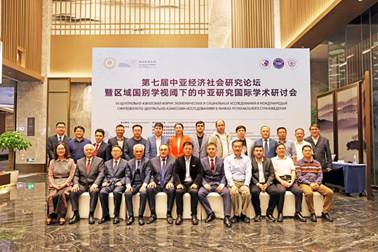
During the forum’s special invited report session, Luo Lin, director of the Secretariat for Country and Regional Studies at the Ministry of Education, delivered a speech titled “Regional and Country Studies under the Framework of New University Think Tanks Construction,” emphasizing the importance of interdisciplinary approaches in the field. He highlighted the need to integrate social sciences, humanities, modern technology, and cross-disciplinary methodologies to advance regional and country studies.
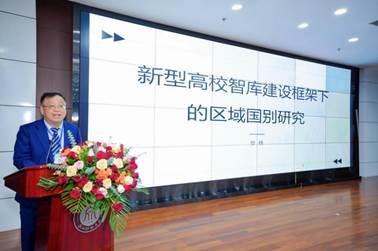
Additionally, Sun Zhuangzhi, director of the Institute of Russian, Eastern European, and Central Asian Studies at the Chinese Academy of Social Sciences, presented on “Research on Central Asian Issues: Perspectives from Regional and Country Studies.” He emphasized the necessity of examining Central Asian issues from multiple angles, including global and international perspectives, regional and country-specific analyses, China-Central Asia development studies, cultural considerations, and security concerns.
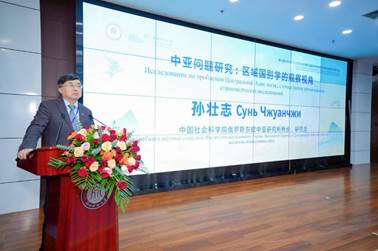
The keynote report session featured extensive discussions on various topics, including digital civilization and cooperation with Central Asia, China-Central Asia political and economic relations, demographic studies and regional collaboration, the development of Luban Workshops in Central Asia, current Central Asia geopolitical dynamics and China-Central Asia relations, the Silk Road Economic Belt and economic cooperation in the Gorno-Altai region, China-Central Asia economic and trade development, as well as educational cooperation and cultural exchanges. Participants included experts from institutions such as the Chinese Academy of Social Sciences, Xi’an Jiaotong University, Beijing Language and Culture University, Northwest University, Shanghai International Studies University, Zhejiang Development & Planning Institute, and universities from Central Asia.
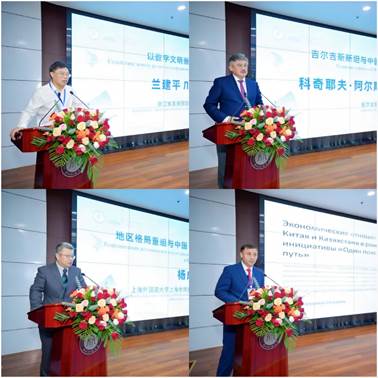
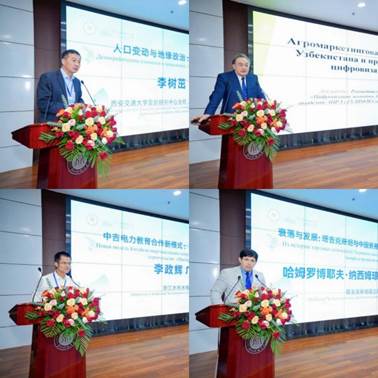
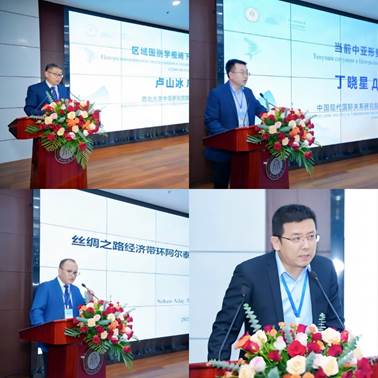
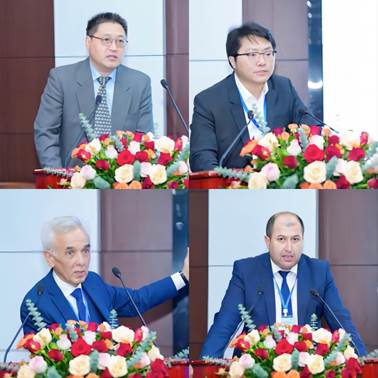

During the forum for young and mid-career scholars, participants from institutions such as the Shanghai Academy of Social Sciences and the University of Glasgow in the UK engaged in in-depth and lively discussions on topics such as India’s Central Asia strategy and its implications for China-Central Asia cooperation, Kazakhstan’s ethnic politics, and the legal framework for investment in Kazakhstan.
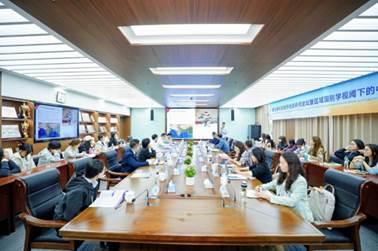
At the round-table session, distinguished guests—including Li Dehua, Xinjiang bureau chief of China News Service; Professor Yang Cheng, Executive Dean of the Shanghai Academy of Global Governance & Area Studies at Shanghai International Studies University; Professor Aday Seken from L.N. Gumilyov Eurasian National University in Kazakhstan; Ouyang Huabin, director of International Talent Management at the Yangtze Delta Region Institute of Tsinghua University, Zhejiang; Shen Binbin from Zhejiang Yuexiu University of Foreign Languages; and Xiong Jianguo, Associate Dean of the School of Foreign Languages at ZUFE—held lively and interactive discussions on topics such as field research under interdisciplinary regional and country studies, cross-disciplinary integration, think tank construction, and talent cultivation.
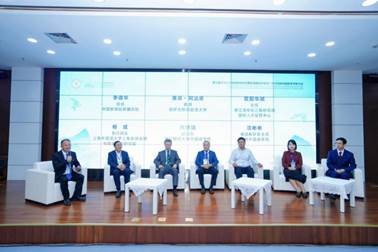
This forum brought together an impressive array of experts, with domestic and international guests engaging in comprehensive exchanges from multidisciplinary, multidimensional, and multifaceted perspectives. , fostering deeper cooperation in regional and country studies. It contributed fresh insights, innovative solutions, and new opportunities for the development of think tanks along with regional and country disciplines focused on Central Asia. Furthermore, it played a crucial role in advancing Chinese modernization and promoting the vision of a global community with a shared future.
